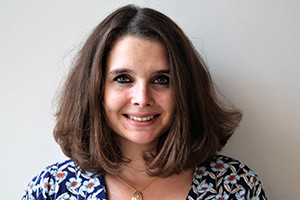Cécile Thomé, postdoc
Cécile Thomé is postdoc at the Sexual and reproductive Health and Rights Unit (Research team in partnership with Inserm - Univ Paris-Saclay - UVSQ) (UR14).
My post-doctoral project is entitled, “Attitudes to the body and health in the contraceptive choices of young women in France by social milieu.”
How are applicants recruited for a post-doctoral contract at INED and how long is the contract for?

I was recruited by INED for 24 months after an application procedure run by INED and the “Individuals, Populations, Sociétés” (iPOPs) Laboratory of Excellence. Two positions were available, one of them at INED for a period of two years. To apply you need to contact an INED researcher—Virginie Rozée, in my case—and submit a five-page research project.
What are the specificities of a post-doctoral contract?
These contracts are for time-limited research studies. Studies may be linked to a broader project (an ANR [National Research Agency] or ERC [European Research Council] project, for example). But the INED post-doctorate is independent: the researcher is integrated into an INED unit and mentored by their referent. You also benefit from the intellectual emulation that comes with working in a research unit—and at INED. However, post-docs conduct their own research. Since the time frame is fairly short compared to the PhD thesis, it’s crucial to have already clearly delimited the contours of your study and your methodology in the application itself and to be ready to get started on the project as soon as the contract period begins.
What you are working on at INED?
My post-doctoral project concerns how young women (aged 20 to 30) who use contraception of some kind view about their body and health. It goes beyond the paradigm of contraceptive effectiveness; the point is to see how taking into account the various effects that contraceptive methods (not all of which are medical) have on these women’s bodies, health, and sense of self will help us better understand their use among young women in different social milieus, and how that use is currently evolving in connection with this generation’s different, renewed attitudes to the body and health and their demand for more “natural”—or in any case less “hormonal”—methods. The project draws on observations from my PhD thesis that I did not have time to explore then, while building on various components of that research, particularly, attitudes toward the medical world. It comprises a quantitative section (analysis of existing INED/INSERM surveys and data collected online) and a qualitative one (interviews with young women of varying social milieus).
But being at INED—especially being hosted at RU 14—has also enabled me to get involved in very stimulating collective projects directly related to my post-doctoral project. I’ve joined the team in charge of setting up the next major survey on contraception, “Fécondité,” and I’m also involved in the ANR’s “Sexpairs” or “peer-led interactive and participatory online community as a tool to promote sexual and reproductive health of adolescents and young adults.”
(Interview conducted in June 2021)
